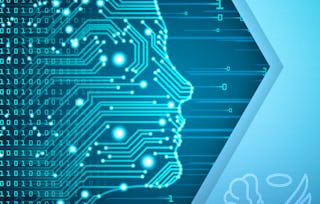Artificial intelligence, particularly with the introduction of generative AI, is fundamentally impacting a huge spectrum of human experience. This ranges from the vast majority of jobs and professions to education, healthcare, media and entertainment, and much more. These rapid advances have been accompanied by a huge array of fundamental and greatly impactful ethical challenges, including bias and inaccuracy in AI systems, where AI systems should and shouldn’t replace humans, and potential benefits and harms from various types of autonomous systems, and existential issues including the future of human work and the possibility of AI systems whose intelligence exceeds that of humans.

Current Issues in Ethics and AI
Ends soon: Gain next-level skills with Coursera Plus for $199 (regularly $399). Save now.

Recommended experience
What you'll learn
Identify and manage ethical situations related to AI that may occur in learners' careers.
Identify and assess ethical challenges arising from AI, including algorithmic bias and uses in healthcare, robotics, criminal justice, and warfare.
Understand and analyze societal challenges related to AI including energy consumption, the future work of work, and artificial general intelligence.
Skills you'll gain
Details to know

Add to your LinkedIn profile
October 2025
6 assignments
See how employees at top companies are mastering in-demand skills

There are 5 modules in this course
In the first module of this course introduces you to the topic of current ethical issues in AI from several perspectives. After providing an overview of the course including the learning objectives and what work is required of you, you’ll gain insights into key ethical theories that will underlie discussions throughout the course. These include Kantianism, Virtue Ethics, Utilitarianism, and Social Contract Theory. Then we’ll further motivate the course by looking at key ethical concerns that have been identified related to the uses of AI, and the range and pace of AI development and use.
What's included
8 videos6 readings2 assignments
In this module, we look at fundamental ethical issues in AI: fairness, bias, and accuracy of algorithms based upon AI. Our lessons focus on three main topics: identity-related bias in large language models; bias in large language models related to images, both image generation and facial recognition; and misinformation and privacy issues in large language models. Through discussions and your independent assessment of current articles, you will gain an understanding of core ethical issues related to generative AI and large language models.
What's included
7 videos4 readings1 assignment
In this module and the next, we switch from broad, general discussion of ethical issues associated with AI, to discussions focused on specific, important sectors. The first of those, which we cover in this module, is one of most important sectors for all people, healthcare. Our coverage includes a brief overview of the myriad uses of AI in healthcare, discussion of a few of many general ethical issues related to uses of AI in healthcare, and a particularly intriguing specific topic, the nascent field of neural implants. The discussions, readings, and an interview assignment will provide you with perspectives on this topic.
What's included
6 videos3 readings1 assignment
In this module, we explore a very broad area of AI which has great importance and leads to many compelling ethical issues, robotics. The applications of robotics are diverse, and we explore issues associated with three different uses: in healthcare, in policing and the justice system, and in warfare. As is the case throughout the course, our readings reflect very recent developments and applications. The material covered in these lessons is enhanced by a report you will create in an article that pertains to either this topic or to the use of AI in healthcare.
What's included
6 videos3 readings1 assignment
In this final module of the course, we explore our broadest topic and a very interesting one: the societal impacts of AI. There are many topics in this category, and we explore four of them: the prospects and risks of artificial general intelligence; how AI should be regulated; the energy implications of AI, both negative and positive; and the implications of AI for the future of human work and employment. We sample reading about these topics, each of which could be a course by itself, and reinforce what we have learned by formulating our opinions on one of these topics and then having a conversation on the topic with an AI chatbot. We conclude with a brief course wrap-up which includes discussion of how AI professionals should deal with ethical considerations, in the workplace and generally.
What's included
13 videos6 readings1 assignment
Instructor

Offered by
Explore more from Algorithms
 Status: Free Trial
Status: Free TrialUniversity of Colorado Boulder
 Status: Preview
Status: PreviewLund University
 Status: Free Trial
Status: Free TrialAlex Genadinik
 Status: Preview
Status: PreviewNortheastern University
Why people choose Coursera for their career




Frequently asked questions
To access the course materials, assignments and to earn a Certificate, you will need to purchase the Certificate experience when you enroll in a course. You can try a Free Trial instead, or apply for Financial Aid. The course may offer 'Full Course, No Certificate' instead. This option lets you see all course materials, submit required assessments, and get a final grade. This also means that you will not be able to purchase a Certificate experience.
When you purchase a Certificate you get access to all course materials, including graded assignments. Upon completing the course, your electronic Certificate will be added to your Accomplishments page - from there, you can print your Certificate or add it to your LinkedIn profile.
Yes. In select learning programs, you can apply for financial aid or a scholarship if you can’t afford the enrollment fee. If fin aid or scholarship is available for your learning program selection, you’ll find a link to apply on the description page.
More questions
Financial aid available,





